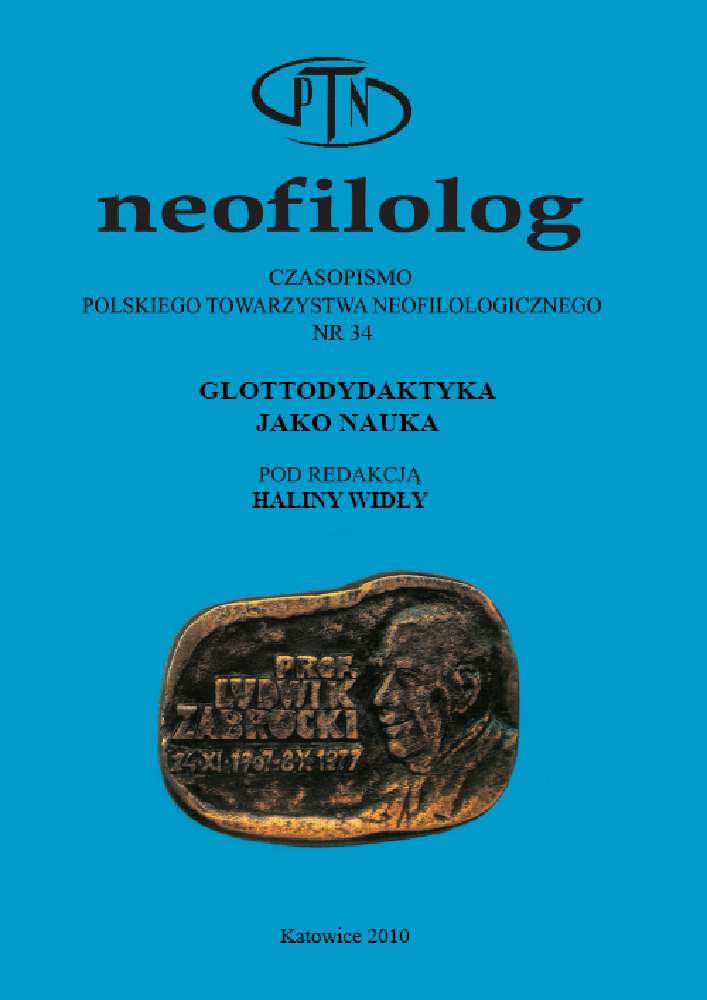Abstract
The purpose of the following article is to discuss the theoretical framework of diagnostic research used in glottodidactics as well as to analyze some selected diagnostic studies conducted by Polish and German researchers in the last decade into the development of high school and university students’ and foreign language teachers’ intercultural competence. In the last part of this article attention is paid to the presentation and discussion of the most frequent problems which researchers encounter while planning and carrying out diagnostic studies.
References
Aleksandrowicz-Pędich, L. 2005. Międz ykulturowość na lekcjach języków obcych. Białystok: Wydawnictwo Uniwersytetu w Białymstoku.
Apeltauer, E. 2001. Stereotype als Voraussetzung interkultureller Kommunikation. Deutschland und die Deutschen aus norwegischer Sicht. (= Flensburger Papiere zur Mehrsprachigkeit und Kulturenvielfalt im Unterricht, Heft 28/29).
Bandura, E. 2007. Naucz yciel jako mediator kulturowy. Kraków: Krakowskie Towarzystwo „Tertium”
Błażek, A. 2008. Evaluation interkultureller Kompetenz bei angehenden Deutschlehrerinnen und -lehrern in Polen. Poznań: Wyd. Naukowe UAM.
Chromiec, E. 2004. Dziecko wobec obcości kulturowej. Gdańsk: Gdańskie Wyd. Psychologiczne.
Komorowska, H. 1982. Metody badań empirycznych w glottodydaktyce. Warszawa: PWN.
Łobocki, M. 2008. Metody i techniki badań pedagogicznych. Kraków: Oficyna Wydawnicza Impuls.
Łobocki, M. 2009. Wprowadzenie do metodologii badań pedagogicznych. Kraków: Oficyna Wydawnicza Impuls.
Mihułka, K. 2006. Zur Stereotypen- und Vorurteilsforschung im Prozess des interkulturellen Lernens. Gdańsk: niepublikowana praca doktorska.
Müller, B.-D. 1994. Wortschatzarbeit und Bedeutungsvermittlung. Berlin: Langenscheidt.
Muszyński, H. 1970. Wstęp do metodologii pedagogiki. Warszawa: PWN.
Oppenheim, A.-N. 2004. Kwestionariusze, wywiady, pomiary postaw. Poznań: Wyd. Zysk i S-ka.
Picht, R. 1980. „Interesse und Vergleich: zur Sozialpsychologie des Deutschlandsbilds“. Jahrbuch Deutsch als Fremdsprache 6. 120 – 132.
Pilch, T. i Bauman, T. 2001. Zasady badań pedagogicznych. Strategie ilościowe i jakościowe. Warszawa: Wydawnictwo Akademickie Żak.
Spaniel, D. 2002. „Methoden zur Erfassung von Deutschland-Images. Ein Beitrag zur Stereotypenforschung“. Info DaF 29. 4/2002. 356 – 368.
Spaniel, D. 2004 „Deutschland-Images als Einflussfaktor beim Erlernen der deutschen Sprache“. Deutsch als Fremdsprache 41. 3/2004. 166 – 172.
License
Copyright (c) 1970 Krystyna Mihułka

This work is licensed under a Creative Commons Attribution-NoDerivatives 4.0 International License.
Authors
Authors of texts accepted for publication in Neofilolog are required to complete, sign and return to the Editorial team’s office the Agreement for granting a royalty-free license to works with a commitment to grant a CC sub-license.
Under the agreement, the authors of the texts published in Neofilolog grant Adam Mickiewicz University in Poznań a non-exclusive, royalty-free license and authorize the use of Attribution-NoDerivatives 4.0 International (CC BY-ND 4.0) Creative Commons sub-license.
The authors retain the right to the free disposal of the work.
Users
Interested Internet users are entitled to use works that have been published in Neofilolog since 2017, under the following conditions:
▪ attribution – obligation to provide, together with the distributed work, information about the authorship, title, source (link to the original work, DOI) and the license itself.
▪ no derivatives – the work must be preserved in its original form. Without the author's consent, it is not possible to distribute the modified work in the form of translations, publications, etc.
Copyrights are reserved for all texts published since 2017.
Miscellaneous
Adam Mickiewicz University in Poznań retains the property right as a whole (layout, graphic form, title, cover design, logo etc.).
